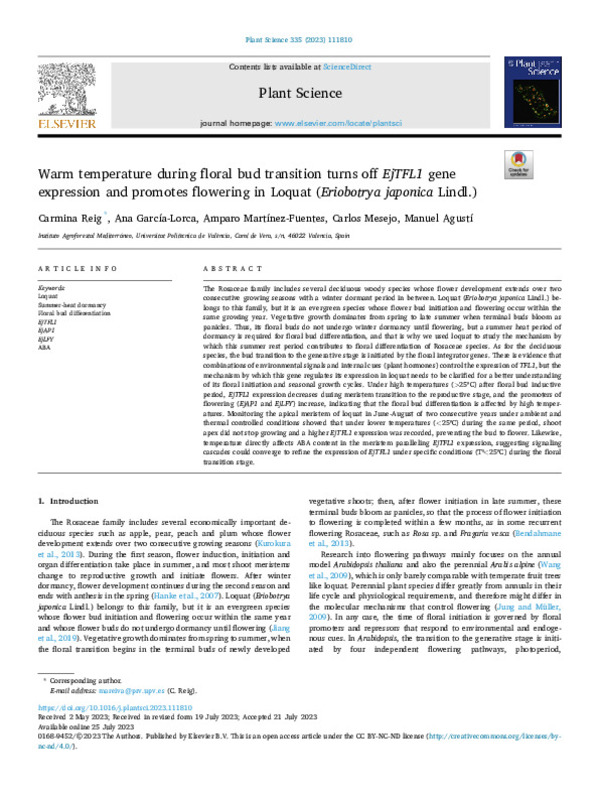JavaScript is disabled for your browser. Some features of this site may not work without it.
Buscar en RiuNet
Listar
Mi cuenta
Estadísticas
Ayuda RiuNet
Admin. UPV
Warm temperature during floral bud transition turns off EjTFL1 gene expression and promotes flowering in Loquat (Eriobotrya japonica Lindl)
Mostrar el registro sencillo del ítem
Ficheros en el ítem
| dc.contributor.author | García-Lorca, Ana
|
es_ES |
| dc.contributor.author | Reig Valor, Carmina
|
es_ES |
| dc.contributor.author | Martinez Fuentes, Amparo
|
es_ES |
| dc.contributor.author | Agustí Fonfría, Manuel
|
es_ES |
| dc.contributor.author | Mesejo Conejos, Carlos
|
es_ES |
| dc.date.accessioned | 2024-04-18T18:08:44Z | |
| dc.date.available | 2024-04-18T18:08:44Z | |
| dc.date.issued | 2023-10 | es_ES |
| dc.identifier.issn | 0168-9452 | es_ES |
| dc.identifier.uri | http://hdl.handle.net/10251/203600 | |
| dc.description.abstract | [EN] The Rosaceae family includes several deciduous woody species whose flower development extends over two consecutive growing seasons with a winter dormant period in between. Loquat (Eriobotrya japonica Lindl.) belongs to this family, but it is an evergreen species whose flower bud initiation and flowering occur within the same growing year. Vegetative growth dominates from spring to late summer when terminal buds bloom as panicles. Thus, its floral buds do not undergo winter dormancy until flowering, but a summer heat period of dormancy is required for floral bud differentiation, and that is why we used loquat to study the mechanism by which this summer rest period contributes to floral differentiation of Rosaceae species. As for the deciduous species, the bud transition to the generative stage is initiated by the floral integrator genes. There is evidence that combinations of environmental signals and internal cues (plant hormones) control the expression of TFL1, but the mechanism by which this gene regulates its expression in loquat needs to be clarified for a better understanding of its floral initiation and seasonal growth cycles. Under high temperatures (>25 & DEG;C) after floral bud inductive period, EjTFL1 expression decreases during meristem transition to the reproductive stage, and the promoters of flowering (EjAP1 and EjLFY) increase, indicating that the floral bud differentiation is affected by high temperatures. Monitoring the apical meristem of loquat in June-August of two consecutive years under ambient and thermal controlled conditions showed that under lower temperatures (<25 & DEG;C) during the same period, shoot apex did not stop growing and a higher EjTFL1 expression was recorded, preventing the bud to flower. Likewise, temperature directly affects ABA content in the meristem paralleling EjTFL1 expression, suggesting signaling cascades could converge to refine the expression of EjTFL1 under specific conditions (T<25 & DEG;C) during the floral transition stage. | es_ES |
| dc.language | Inglés | es_ES |
| dc.publisher | Elsevier | es_ES |
| dc.relation.ispartof | Plant Science | es_ES |
| dc.rights | Reconocimiento - No comercial - Sin obra derivada (by-nc-nd) | es_ES |
| dc.subject | Loquat | es_ES |
| dc.subject | Summer-heat dormancy | es_ES |
| dc.subject | Floral bud differentiation | es_ES |
| dc.subject | EjTFL1 | es_ES |
| dc.subject | EjAP1 | es_ES |
| dc.subject | EjLFY | es_ES |
| dc.subject | ABA | es_ES |
| dc.subject.classification | PRODUCCION VEGETAL | es_ES |
| dc.title | Warm temperature during floral bud transition turns off EjTFL1 gene expression and promotes flowering in Loquat (Eriobotrya japonica Lindl) | es_ES |
| dc.type | Artículo | es_ES |
| dc.identifier.doi | 10.1016/j.plantsci.2023.111810 | es_ES |
| dc.rights.accessRights | Abierto | es_ES |
| dc.contributor.affiliation | Universitat Politècnica de València. Escuela Técnica Superior de Ingeniería Agronómica y del Medio Natural - Escola Tècnica Superior d'Enginyeria Agronòmica i del Medi Natural | es_ES |
| dc.description.bibliographicCitation | García-Lorca, A.; Reig Valor, C.; Martinez Fuentes, A.; Agustí Fonfría, M.; Mesejo Conejos, C. (2023). Warm temperature during floral bud transition turns off EjTFL1 gene expression and promotes flowering in Loquat (Eriobotrya japonica Lindl). Plant Science. 335. https://doi.org/10.1016/j.plantsci.2023.111810 | es_ES |
| dc.description.accrualMethod | S | es_ES |
| dc.relation.publisherversion | https://doi.org/10.1016/j.plantsci.2023.111810 | es_ES |
| dc.type.version | info:eu-repo/semantics/publishedVersion | es_ES |
| dc.description.volume | 335 | es_ES |
| dc.identifier.pmid | 37500016 | es_ES |
| dc.relation.pasarela | S\512441 | es_ES |
| dc.contributor.funder | Universitat Politècnica de València | |
| dc.subject.ods | 02.- Poner fin al hambre, conseguir la seguridad alimentaria y una mejor nutrición, y promover la agricultura sostenible | es_ES |








